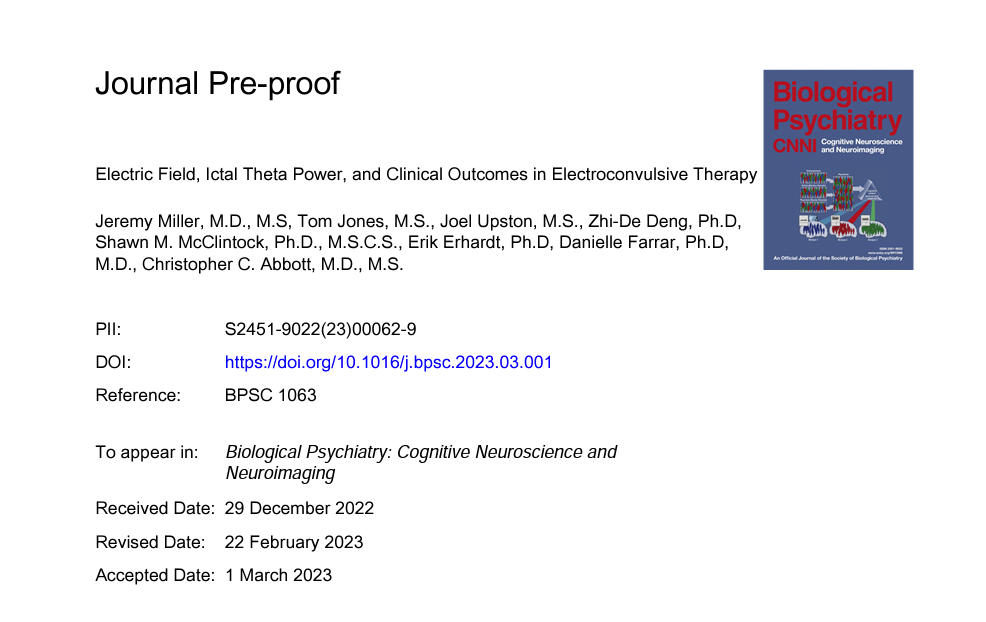Electric Field, Ictal Theta Power, and Clinical Outcomes in Electroconvulsive Therapy.
Out on PubMed, from investigators in the USA, is this paper:
Electric Field, Ictal Theta Power, and Clinical Outcomes in Electroconvulsive Therapy.
Biol Psychiatry Cogn Neurosci Neuroimaging. 2023 Mar 14:S2451-9022(23)00062-9. doi: 10.1016/j.bpsc.2023.03.001. Online ahead of print.PMID: 36925066
The abstract is copied below:
Background: Electroconvulsive therapy (ECT) is efficacious for treatment resistant depression. Treatment-induced cognitive impairment can adversely impact functional outcomes. Our pilot study linked the electric field to ictal theta power from a single suprathreshold treatment and ictal theta power to changes in phonemic fluency. In this study, we set out to replicate our findings and expand upon the utility of ictal theta power as a potential cognitive biomarker.
Methods: Twenty-seven subjects (nine male and eighteen female) received right unilateral ECT for treatment resistant depression. Pre-ECT magnetic resonance imaging and finite element modeling determined the 90th percentile maximum electric field in the brain (Ebrain). Two-lead electroencephalographs were digitally captured across the ECT course with the earliest suprathreshold treatment used to determine power spectral density. Clinical and cognitive outcomes were assessed pre-, mid-, and post-ECT. We assessed the relationship between Ebrain, ictal theta power, clinical outcome (Inventory of Depressive Symptomatology), and cognitive outcomes (phonemic and semantic fluency) with linear models.
Results: Ictal theta power in the Fp1 and Fp2 channels was associated with the electric field, antidepressant outcome, and phonemic and semantic fluency. The relationship between ictal theta power and phonemic fluency was strengthened in the longitudinal analysis. Ebrain was directly associated with phonemic and semantic fluency, but not antidepressant outcome.
Conclusion: Ictal theta power is a potential cognitive biomarker early on in ECT course to help guide parameter changes. Larger studies are needed to further assess ictal theta power's role in predicting mood outcome and changes with ECT parameters.
Keywords: Electroconvulsive therapy; biomarker; clinical outcomes; electric field; ictal theta power; phonemic fluency.
The article is here.
And from the text:

Some elegant figures and complex theories about electrical field modeling make this paper attractive. ECT EEG aficionados may like it.
But in my opinion, elevating transient cognitive effects into a "safety" issue is unnecessary and harmful: I wish ECT authors would be more careful in their wording. Perhaps other groups will try to replicate whether theta power could be used as a biomarker of cognitive effects and tolerability.




Comments
Post a Comment